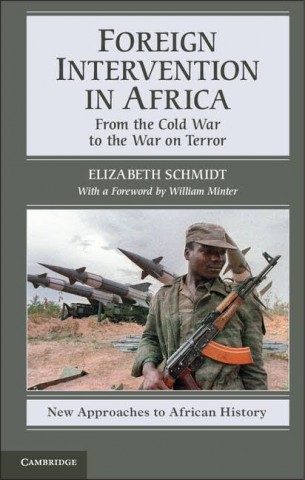Elizabeth Schmidt is a professor of history at Loyola University. The following thought provoking quotes are taken from her 2013 book "Foreign Intervention in Africa: From the Cold War to the War on Terror."
The context:
- "For many outsiders, the word Africa conjures up images of a continent in crisis, riddled with war and corruption, imploding from disease and starvation. Africans are regularly blamed for their plight. They are frequently viewed as being intolerant of ethnic and religious differences but accepting of corruption and dictatorship. They are often presumed to be unwilling or unable to govern themselves. This book challenges such popular myths. By examining the historical roots of contemporary problems, the book demonstrates that many of the predicaments that plague the continent today are not solely the result of African decisions but also the consequences of foreign intrusion into African affairs." (1)
Flipping slides and changing support:
- "African-superpower alliances in the Horn were complex and fluid. In the early 1970s, the United States helped sustain Emperor Haile Selassie's feudal order in Ethiopia while the nominally socialist military regime of Mohamed Said Barre in Somalia was supported by the Soviet Union. However, by 1978, after a military coup in Ethiopia had brought a self-proclaimed Marxist regime to power and Somalia had attempted to annex Somali-inhabited territory in Ethiopia, Moscow and Washington had switched sides." (143)
Framing interventions in Africa:
- "Pervasive anticommunism in some quarters often led to a misunderstanding of nationalist movements. Radical nationalism was frequently confused with communism – or viewed as an equal threat to Western interests. Fear of communism – real or imagined – led the U.S. government to support many unsavory dictatorships. Although the dictatorships were pro-Western and anticommunist, they did not promote the freedom and democracy that Washington claimed to endorse. In the case of Southern Africa, a region valued for its strategic location and minerals and home to a significant population of white settlers, conflicting American interests led the United States to reinforce, rather than oppose, colonialism and white-minority rule." (24)
- "The inadequacy of the Cold War framework did not stop the white-minority regimes from attempting to employ it. The ruling powers in Rhodesia, Namibia, and South Africa all sought to present their opposition to equal rights in Cold War terms. In doing so, they gained support from some constituencies in the United States and other Western countries." (135)
On privilege and power:
- "Although they had come at the request of the Congolese government, the UN forces were under Western authority. Western priorities included first and foremost the protection of white lives and property and the resolution of the crisis to the benefit of Western political and economic interests." (61)
- "Guinean nationalist leader, Sekou Toure, responded, "We prefer poverty in liberty to riches in slavery." On referendum day, 94 percent of Guinean voters cast their ballots for independence. For Guinea, the consequences of that choice were devastating, as France retaliated physically and economically, and the new country's attempts to establish relations as a coequal partner were rebuffed." (174)
Cold War legacy:
- "Although the conflicts in the Horn had deep local roots, they were exacerbated by the Cold War interventions of the superpowers and their allies. Without the vast quantities of weapons provided by the United States and the Soviet Union, local conflicts would not have escalated into regional ones that took an enormous toll in the human life. The militarization and destabilization of the Horn during the Cold War are at the root of the conflicts that continue to devastate the region in the twenty-first century." (144)
- "…during the period under consideration (1945-2010), foreign intervention in African generally did more harm than good. External involvement often intensified conflicts and rendered them more lethal. Even humanitarian and peacekeeping missions, which were weakened by inadequate mandates, funding, and information and undermined by conflicting interests, sometimes hurt the people they were intended to help" (230)
1412 Hits

